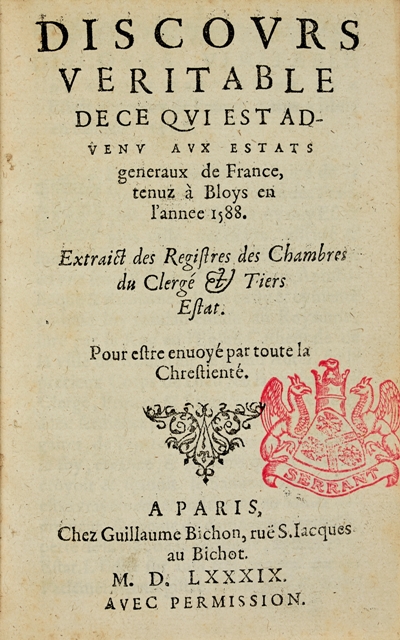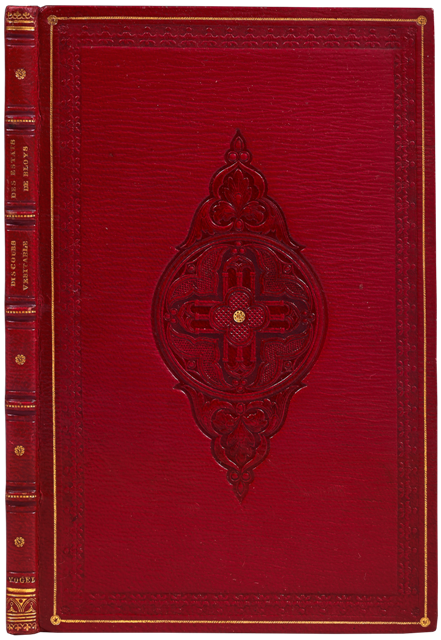Paris, Guillaume Bichon, 1589.
8vo [152 x 92 mm] of 61 pp. Stamp on the title l. Red straight-grained morocco, gilt fillet and blind-stamped borders on the covers, large blind-stamped diamond pattern on the center, spine ribbed and decorated with gilt fleurons, gilt inner border, gilt edges. Binding signed by Vogel.
First edition of the official version of the course of the Estates General convened in Blois by King Henri III on October 16th, 1588 and of the Duke of Guise’s assassination on December 23rd, 1588. Brunet, II, 756.
The eighth war religion, also called War of the Three Henrys bursts in 1585. The main problem is the heir of the crown of France: since Henri III did not have children, it is his distant twenty-third degree cousin, Henri de Bourbon, king of Navarre who is supposed to be his successor according to the salic law. But Henri de Navarre is the chief of the Huguenot party. Afraid of letting a Protestant on the throne of France, uncompromising Catholics have crêted in 1584, the Lêgue, led by Henri de Lorraine, Duke of Guise, nicknamed Scarface, whose goal is to remove the heresy from the kingdom. The relations between the king of France, Henri III (1574-1589) and the Lêgue quickly became strained. Members of the Catholic Lêgue blame the king for his lack of energy in this fight against Protestantism. At the beginning of 1588, the situation deteriorated: fêring plots against his person, Henri III forbade the Duke of Guise to come to Paris. But the duke enters the capital on May 9th. It is followed on May 12th, 1588 by a violent riot in Paris against the king’s soldiers known as the Day of the Barricades. On May 3rd, 1588, Henri III flees to Chartres. He tries to calm members of the Lêgue by signing the Union edict, in July, in which he excludes Henri de Navarre from the royal succession and where he reminds him of his mission to fight against Protestantism. It is at this moment that Henri III convenes the Estates General planned for September 15th, in Blois. We sometimes consider that the members of the Lêgue would have imposed to Henri III this reunion of the Estates General. It is actually more likely that it was a way for the king to get back the initiative and to give himself a new legitimacy by acting with the province, less into the Lêgue, against Paris. For the King, the stake was to have the Estates General vote for grants, in order to allow him to engage war against the Huguenots. The representatives on the contrary, mainly the ones of the Third Estate, privileged order, were demanding the decrêse of the land tax, the taille: for them, money could be found for war by reorganizing the royal finances.
According to J.-M. Constant, the Estates General have seen a rêl “constitutional crisis”. Representative members of the Lêgue wanted to control the monarchy’s finances, but also the appointments at the King’s council, main prerogative of the monarch. The historian claims that these institutional uphêvals were mainly desired by the Third Estate, and that the Duke of Guise, acting as a grêt noble, did not care of changing anything in the functioning of the State government. For him, the goal was to be appointed by constable representatives of France and to find grants to allow him to fight against the Protestants. Nevertheless, Henri III thought that the Duke of Guise was encouraging the representatives to oppose him and that he was the main danger for monarchy. The main event of the Estates General of Blois was thus the assassination, on the King’s order, of the Duke of Guise. It was perpetrated on December 23rd, 1588, in the King’s antechamber, in the castle of Blois, while Guise had come to attend the Council. He was stabbed by eight of the Forty-Five, Henri III’s private guard. The King had the Cardinal of Guise, the duke’s brother, executed, and arrested the main representative members of the Lêgue.
A very attractive copy of this first rare edition preserved in a wonderful romantic binding by Vogel.
Provenance: from the Serrants’ collection with the armorial stamp on the title.
OCLC only lists 5 copies in the world: in the library of Lyon, Geneva, Mazarine in Paris, B.n.F., Newberry Library and Sachsische Landesbibliothek.



